Saturday, December 29, 2007
The Goddess is Back Blogging
Rundown on Election Fraud
They'll probably be a third time.
Wednesday, December 26, 2007
And it's A Special Greg Palast Christmas...
![]() And here's a special Greg Palast Christmas Story. You can see this story on Democracy Now this Thursday I believe. I highlighted the notable parts.
And here's a special Greg Palast Christmas Story. You can see this story on Democracy Now this Thursday I believe. I highlighted the notable parts.
Good and Evil at the Center of the Earth:
A Quechua Christmas Carol
by Greg Palast
December 24th, 2007
[Quito] I don't know what the hell seized me. In the middle of an hour-long interview with the President of Ecuador, I asked him about his father.
I'm not Barbara Walters. It's not the kind of question I ask.
He hesitated. Then said, "My father was unemployed.”
He paused. Then added, "He took a little drugs to the States... This is called in Spanish a mula [mule]. He passed four years in the states- in a jail.”
He continued. "I'd never talked about my father before."
Apparently he hadn't. His staff stood stone silent, eyes widened.
Correa's dad took that frightening chance in the 1960s, a time when his family, like almost all families in Ecuador, was destitute. Ecuador was the original "banana republic" - and the price of bananas had hit the floor. A million desperate Ecuadorans, probably a tenth of the entire adult population, fled to the USA anyway they could.
"My mother told us he was working in the States."
His father, released from prison, was deported back to Ecuador. Humiliated, poor, broken, his father, I learned later, committed suicide.
At the end of our formal interview, through a doorway surrounded by paintings of the pale plutocrats who once ruled this difficult land, he took me into his own Oval Office. I asked him about an odd-looking framed note he had on the wall. It was, he said, from his daughter and her grade school class at Christmas time. He translated for me.
"We are writing to remind you that in Ecuador there are a lot of very poor children in the streets and we ask you please to help these children who are cold almost every night.”
It was kind of corny. And kind of sweet. A smart display for a politician.
Or maybe there was something else to it.
Correa is one of the first dark-skinned men to win election to this Quechua and mixed-race nation. Certainly, one of the first from the streets. He'd won a surprise victory over the richest man in Ecuador, the owner of the biggest banana plantation.
Doctor Correa, I should say, with a Ph.D in economics earned in Europe. Professor Correa as he is officially called - who, until not long ago, taught at the University of Illinois.
And Professor Doctor Correa is one tough character. He told George Bush to take the US military base and stick it where the equatorial sun don't shine. He told the International Monetary Fund and the World Bank, which held Ecuador's finances by the throat, to go to hell. He ripped up the "agreements" which his predecessors had signed at financial gun point. He told the Miami bond vultures that were charging Ecuador usurious interest, to eat their bonds. He said ‘We are not going to pay off this debt with the hunger of our people. ” Food first, interest later. Much later. And he meant it.
It was a stunning performance. I'd met two years ago with his predecessor, President Alfredo Palacio, a man of good heart, who told me, looking at the secret IMF agreements I showed him, "We cannot pay this level of debt. If we do, we are DEAD. And if we are dead, how can we pay?" Palacio told me that he would explain this to George Bush and Condoleezza Rice and the World Bank, then headed by Paul Wolfowitz. He was sure they would understand. They didn't. They cut off Ecuador at the knees.
But Ecuador didn't fall to the floor. Correa, then Economics Minister, secretly went to Hugo Chavez Venezuela's president and obtained emergency financing. Ecuador survived.
And thrived. But Correa was not done.
Elected President, one of his first acts was to establish a fund for the Ecuadoran refugees in America - to give them loans to return to Ecuador with a little cash and lot of dignity. And there were other dragons to slay. He and Palacio kicked US oil giant Occidental Petroleum out of the country.
Correa STILL wasn't done.
I'd returned from a very wet visit to the rainforest - by canoe to a Cofan Indian village in the Amazon where there was an epidemic of childhood cancers. The indigenous folk related this to the hundreds of open pits of oil sludge left to them by Texaco Oil, now part of Chevron, and its partners. I met the Cofan's chief. His three year old son swam in what appeared to be contaminated water then came out vomiting blood and died.
Correa had gone there too, to the rainforest, though probably in something sturdier than a canoe. And President Correa announced that the company that left these filthy pits would pay to clean them up.
But it's not just any company he was challenging. Chevron's largest oil tanker was named after a long-serving member of its Board of Directors, the Condoleezza. Our Secretary of State.
The Cofan have sued Condi's corporation, demanding the oil company clean up the crap it left in the jungle. The cost would be roughly $12 billion. Correa won't comment on the suit itself, a private legal action. But if there's a verdict in favor of Ecuador's citizens, Correa told me, he will make sure Chevron pays up.
Is he kidding? No one has ever made an oil company pay for their slop. Even in the USA, the Exxon Valdez case drags on to its 18th year. Correa is not deterred.
He told me he would create an international tribunal to collect, if necessary. In retaliation, he could hold up payments to US companies who sue Ecuador in US courts.
This is hard core. No one - NO ONE - has made such a threat to Bush and Big Oil and lived to carry it out.
And, in an office tower looking down on Quito, the lawyers for Chevron were not amused. I met with them.
"And it’s the only case of cancer in the world? How many cases of children with cancer do you have in the States?" Rodrigo Perez, Texaco's top lawyer in Ecuador was chuckling over the legal difficulties the Indians would have in proving their case that Chevron-Texaco caused their kids' deaths. "If there is somebody with cancer there, [the Cofan parents] must prove [the deaths were] caused by crude or by petroleum industry. And, second, they have to prove that it is OUR crude – which is absolutely impossible.” He laughed again. You have to see this on film to believe it.
The oil company lawyer added, "No one has ever proved scientifically the connection between cancer and crude oil." Really? You could swim in the stuff and you'd be just fine.
The Cofan had heard this before. When Chevron's Texaco unit came to their land the the oil men said they could rub the crude oil on their arms and it would cure their ailments. Now Condi's men had told me that crude oil doesn’t cause cancer. But maybe they are right. I'm no expert. So I called one. Robert F Kennedy Jr., professor of Environmental Law at Pace University, told me that elements of crude oil production - benzene, toluene, and xylene, "are well-known carcinogens." Kennedy told me he's seen Chevron-Texaco's ugly open pits in the Amazon and said that this toxic dumping would mean jail time in the USA.
But it wasn't as much what the Chevron-Texaco lawyers said that shook me. It was the way they said it. Childhood cancer answered with a chuckle. The Chevron lawyer, a wealthy guy, Jaime Varela, with a blond bouffant hairdo, in the kind of yellow chinos you'd see on country club links, was beside himself with delight at the impossibility of the legal hurdles the Cofan would face. Especially this one: Chevron had pulled all its assets out of Ecuador. The Indians could win, but they wouldn't get a dime. "What about the chairs in this office?" I asked. Couldn't the Cofan at least get those? "No," they laughed, the chairs were held in the name of the law firm.
Well, now they might not be laughing. Correa's threat to use the power of his Presidency to protect the Indians, should they win, is a shocker. No one could have expected that. And Correa, no fool, knows that confronting Chevron means confronting the full power of the Bush Administration. But to this President, it's all about justice, fairness. "You [Americans] wouldn't do this to your own people," he told me. Oh yes we would, I was thinking to myself, remembering Alaska's Natives.
Correa's not unique. He's the latest of a new breed in Latin America. Lula, President of Brazil, Evo Morales, the first Indian ever elected President of Bolivia, Hugo Chavez of Venezuela. All "Leftists," as the press tells us. But all have something else in common: they are dark-skinned working-class or poor kids who found themselves leaders of nations of dark-skinned people who had forever been ruled by an elite of bouffant blonds.
When I was in Venezuela, the leaders of the old order liked to refer to Chavez as, "the monkey." Chavez told me proudly, "I am negro e indio" - Black and Indian, like most Venezuelans. Chavez, as a kid rising in the ranks of the blond-controlled armed forces, undoubtedly had to endure many jeers of "monkey." Now, all over Latin America, the "monkeys" are in charge.
And they are unlocking the economic cages.
Maybe the mood will drift north. Far above the equator, a nation is ruled by a blond oil company executive. He never made much in oil - but every time he lost his money or his investors' money, his daddy, another oil man, would give him another oil well. And when, as a rich young man out of Philips Andover Academy, the wayward youth tooted a little blow off the bar, daddy took care of that too. Maybe young George got his powder from some guy up from Ecuador.
I know this is an incredibly simple story. Indians in white hats with their dead kids and oil millionaires in black hats laughing at kiddy cancer and playing musical chairs with oil assets.
But maybe it's just that simple. Maybe in this world there really is Good and Evil.
Maybe Santa will sort it out for us, tell us who's been good and who's been bad. Maybe Lawyer Yellow Pants will wake up on Christmas Eve staring at the ghost of Christmas Future and promise to get the oil sludge out of the Cofan's drinking water.
Or maybe we'll have to figure it out ourselves. When I met Chief Emergildo, I was reminded of an evening years back, when I was way the hell in the middle of nowhere in the Prince William Sound, Alaska, in the Chugach Native village of Chenega. I was investigating the damage done by Exxon's oil. There was oil sludge all over Chenega's beaches. It was March 1991, and I was in the home of village elder Paul Kompkoff on the island's shore, watching CNN. We stared in silence as "smart" bombs exploded in Baghdad and Basra.
Then Paul said to me, in that slow, quiet way he had, "Well, I guess we're all Natives now."
Well, maybe we are. But we don't have to be, do we?
Maybe we can take some guidance from this tiny nation at the center of the earth. I listened back through my talk with President Correa. And I can assure his daughter that she didn't have to worry that her dad would forget about "the poor children who are cold" on the streets of Quito.
Because the Professor Doctor is still one of them.
*****
Watch the Palast investigation, Rumble in the Jungle: Big Oil and Little Indians, on BBC Television Newsnight, now on-line via www.GregPalast.com - and Thursday's US broadcast of Democracy Now.
For a copy of Palast's prior reports from Venezuela for BBC and Democracy Now, get "The Assassination of Hugo Chavez," on DVD, filmed by award-winning videographer Richard Rowley.
Labels: economics for trevor, greg palast, real journalism
Monday, December 24, 2007
My Three Fave Hot Classic Trek Ladies
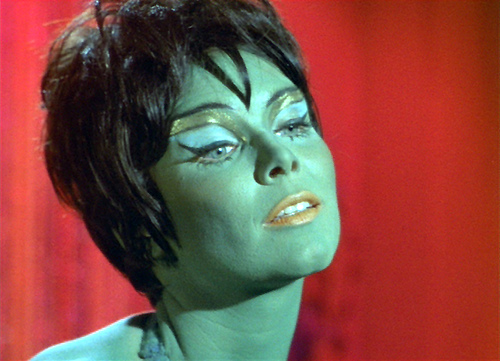
and winner of my fantasy date and or execution in alien combat area is bad actress in silver:
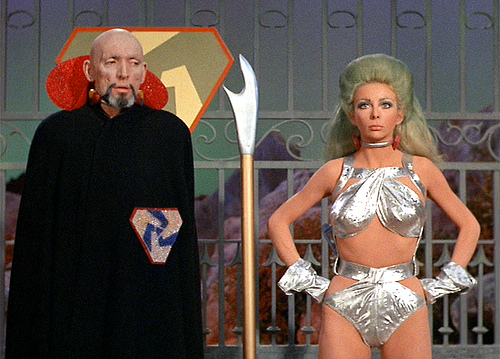
and oh yeah I'll give you something "fascinating" to examine (cue less than subtle Andrew Dice Clay reaction shot/"oh" sound):
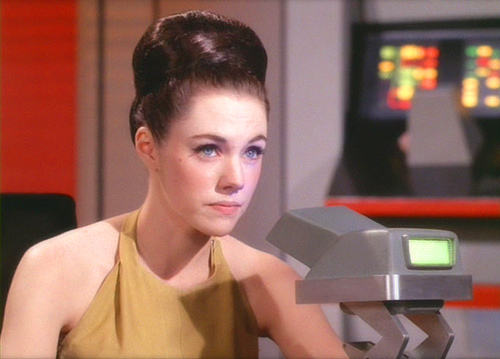
More From Wexler on Impeachment
I was serving in Congress and on the Judiciary Committee for the ridiculous and politically motivated impeachment hearings of President Clinton. During that witch hunt Newt Gingrich, Tom Delay, and Ken Starr wasted a year and a half on investigations and hearings about President Clinton's personal relations. However, this attempted coup d'etat by Republicans against President Clinton was not and should not be the standard of impeachment that was enshrined by the Founders in our Constitution.
First, impeachment hearings are only proper when significant allegations exist that the President or Vice-President, or others civil officers, committed actions – within their official duties – that constitute 'High Crimes and Misdemeanors.' The allegations against Clinton – involving a personal affair - never reached this threshold. The serious charges against Cheney involve alleged crimes that are central to his duties of Vice-President; namely war and peace, the widespread violations of civil liberties, and the security of the United States and our covert agents.
Unlike the show trial put on by Republicans against President Clinton, a proper impeachment hearing would involve a fair and objective presentation of the facts without hyperbole or political gamesmanship. The hard evidence that is presented at the hearings will be judged fully both by Congress and the American people. The evidence alone will determine the outcome, and if it is determined that Vice President Cheney committed "High Crimes and Misdemeanors" he should be properly impeached and put on trial before the Senate.
After the Democratic Party regained control of Congress, many – myself included – thought that it might be possible to meet President Bush half-way on the large issues facing our nation. Unfortunately, Bush has been nothing more than an ideological obstacle. He has vetoed stem cell research. He has vetoed efforts to bring our troops home from Iraq. He vetoed children's health care. So, the idea that we are somehow inhibiting Congress from passing our agenda by holding impeachment hearings – unfortunately – is a false argument.
Instead, I believe that we can both live up to our Constitutional obligation by holding hearings and pass a Democratic agenda. If President Bush perceives that the Democratic Congress is weak and unwilling to aggressively push our agenda – he will continue to veto legislation, such as children's health care – that is supported by a majority of Americans. The only way to move a progressive Democratic agenda is by acting through strength and following through on our core principles. A Congress willing to stand up to the abuses of the Bush Administration through impeachment hearings will demonstrate a strength of will that will more likely convince Bush to accommodate on issues such as Iraq, health care, and energy and environmental issues.
Sunday, December 23, 2007
Iraqi Oil Law Graphic Novel
Dec. 14
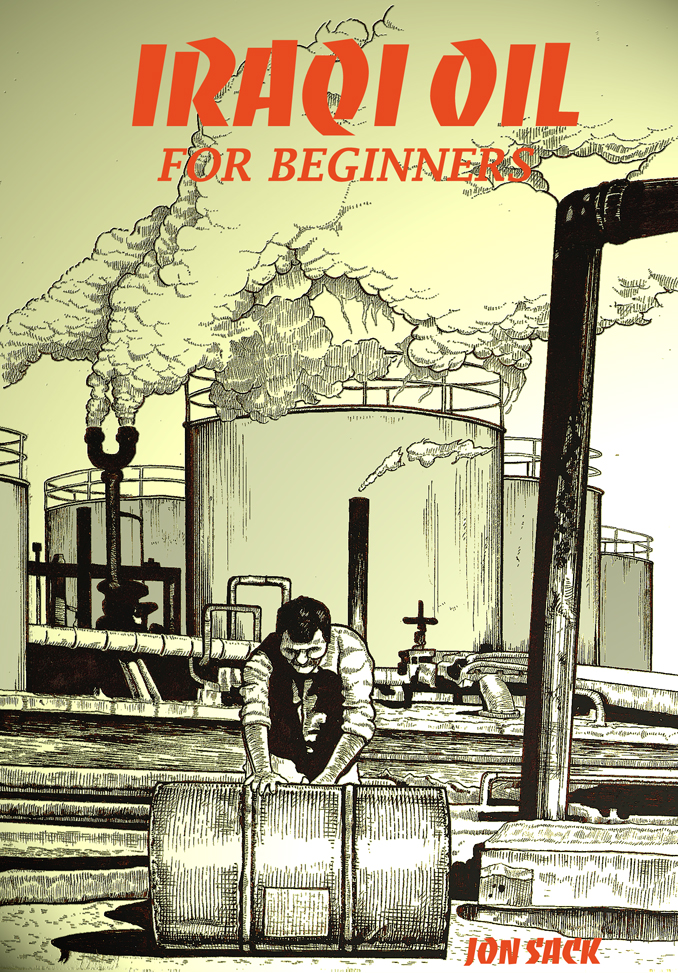
![]() New graphic novel that I would hope Phantom of the Attic would carry, although I'm not sure I could afford it. Review:
New graphic novel that I would hope Phantom of the Attic would carry, although I'm not sure I could afford it. Review:
Housmans, London's 62-year-old "premier radical bookshop," was warm and animated on a rainy Friday night for the launch of a new graphic novel entitled "Iraqi Oil for Beginners." Auspiciously, Hassan Jumaa, president of the Iraq Federation of Oil Unions, was in London to speak at a conference and made a quick appearance at the launch party. Jumaa also happens to be one of the only sympathetic characters in the book.
Written and illustrated by Jon Sack, a young London-based American artist and musician, the 31-page paperback comic book may feel light to the touch but is so densely packed with information that it is more like a historical pamphlet, albeit a droll and caustic one. "I wanted to sex up history a little," says Sack, whose interest in the history of oil in the region was piqued several years ago when he became involved in an organization called Corporate Pirates, which keeps tabs on major corporations - in this case Western firms in Iraq.
He also spent time with Platform, a UK-based social and environmental organization that carries out research on the oil industry. "I take myself as a case in point," says Sack. "I had no idea of the role played by oil companies in Mesopotamia and then Iraq." Funded by the human-rights group Voices in the Wilderness, Sack began his project by piecing together accounts of the British occupation of Iraq in the 1920s, which led to evident parallels with the situation today. ...
Sack's graphic novel begins, perhaps inevitably, with the attacks of September 11, 2001, but then it quickly moves back 90 years to 1911, when Britain's Royal Navy converted its warships from using coal to oil, a pivotal point and catalyst for a growing and ever-increasing hunger for crude.
At the time, Britain had control of one of the first oil refineries in the world in western Iran, then known as Persia. A few years later, in 1914, Britain invaded and occupied Basra in southern Iraq. Sack leads his readers through the complicated creation of oil companies, the British determination of Iraqi borders after World War I and the maneuvering of multinational oil companies to obtain concessions in Iraq. The remaining third of the comic book is dedicated to the 2003 US-led invasion of Iraq and the situation today, and in particular, the impending oil law.
Related:
Support Wexler's Call for Impeachment
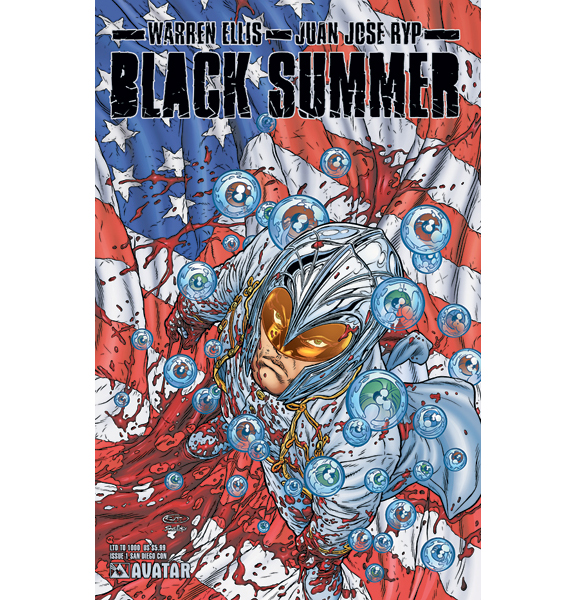
![]() I suppose John Horus has one way of initiating political change. Of course, you could use impeachment. Here's the latest from Wexler. He's completely right. If you don't impeach Bush it shows that there are different rules for the rich and the powerful. You would be telling the public that we're all "little people", that famous line in Bladerunner. Of course, after watching the dem leadership in action I'm beginning to think that's the message they want to send. One rule for us another for you rabble...
I suppose John Horus has one way of initiating political change. Of course, you could use impeachment. Here's the latest from Wexler. He's completely right. If you don't impeach Bush it shows that there are different rules for the rich and the powerful. You would be telling the public that we're all "little people", that famous line in Bladerunner. Of course, after watching the dem leadership in action I'm beginning to think that's the message they want to send. One rule for us another for you rabble...
Thank you Chris Dodd and Why I like John Edwards
![]() And thank you Chris Dodd, again. I would prefer that you were the majority leader though, and not president.
And thank you Chris Dodd, again. I would prefer that you were the majority leader though, and not president.
I still think that John Edwards is the best progressive choice--who actually has a shot at winning-- we can get for the presidency. Here's why I like him:
He also makes the case against Hillary:
Related: Atrios sort of endorses Edwards. Shorter candidates Quote here:
Shorter Candidates
Obama: The system sucks, but I'm so awesome that it'll melt away before me.
Edwards: The system sucks, and we're gonna have to fight like hell to destroy it.
Clinton: The system sucks, and I know how to work within it more than anyone.
Okay, who's best the melt guy or the insider? I'm going with two. I wish Atrios would endorse Edwards now as opposed to that Chuck Penn endorsement that he gave the day of the election that didn't do jack...